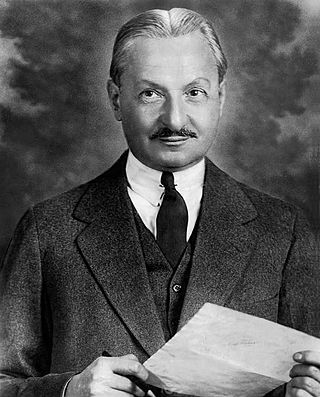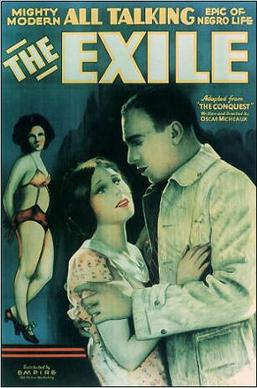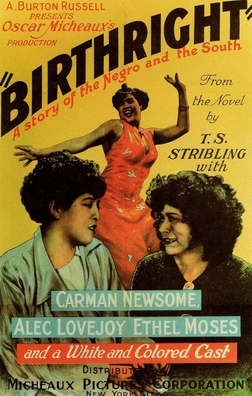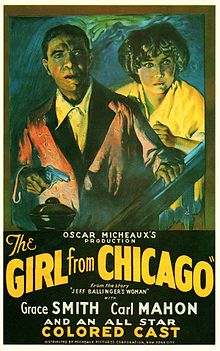
Florenz Edward Ziegfeld Jr. was an American Broadway impresario, notable for his series of theatrical revues, the Ziegfeld Follies (1907–1931), inspired by the Folies Bergère of Paris. He also produced the musical Show Boat. He was known as the "glorifier of the American girl". Ziegfeld is a member of the American Theater Hall of Fame.

Body and Soul is a 1925 race film produced, written, directed, and distributed by Oscar Micheaux and starring Paul Robeson in his motion picture debut. In 2019, the film was selected by the Library of Congress for inclusion in the National Film Registry for being "culturally, historically, or aesthetically significant".

Evelyn Preer, was an African American pioneering screen and stage actress, and jazz and blues singer in Hollywood during the late-1910s through the early 1930s. Preer was known within the Black community as "The First Lady of the Screen."

The Exile is a 1931 American pre-Code film directed by Oscar Micheaux with choreography by Leonard Harper. A drama-romance of the race film genre, The Exile was Micheaux's first feature-length sound film, and the first African-American sound film. Adapted from Micheaux's first novel The Conquest (1913), it the film shares some autobiographical elements; for example, Micheaux spent several years as a cattle rancher in an otherwise all-white area of South Dakota as does the film's central character Jean Baptiste.

The race film or race movie was a genre of film produced in the United States between about 1915 and the early 1950s, consisting of films produced for black audiences, and featuring black casts. Approximately five hundred race films were produced. Of these, fewer than one hundred remain. Because race films were produced outside the Hollywood studio system, they were largely forgotten by mainstream film historians until they resurfaced in the 1980s on the BET cable network. In their day, race films were very popular among African-American theatergoers. Their influence continues to be felt in cinema and television marketed to African-Americans.

Going Wild is a 1930 Warner Brothers pre-Code comedy film based on the 1910 play The Aviator by James Montgomery and directed by William A. Seiter. The film stars many musical stars along with Joe E. Brown, Frank McHugh and Johnny Arthur.
The House Behind the Cedars is a 1927 silent race film directed, written, produced and distributed by the noted director Oscar Micheaux. It was loosely adapted from the 1900 novel of the same name by African-American writer Charles W. Chesnutt, who explored issues of race, class and identity in the post-Civil War South. No print of the film is known to exist, and it is considered lost. Micheaux remade the film in 1932 under the title Veiled Aristocrats.

Veiled Aristocrats is a 1932 American pre-Code race film written, directed, produced and distributed by Oscar Micheaux. The film deals with the theme of "passing" by mixed-race African Americans to avoid racial discrimination. It is a remake of The House Behind the Cedars (1927), based on a novel by the same name published in 1900 by Charles W. Chesnutt. Micheaux may have borrowed the new title from a 1923 novel by Gertrude Sanborn.

Broadway Babies, aka Broadway Daddies (UK) and Ragazze d'America (Italy), is a 1929 all-talking Pre-Code black and white American musical film produced and distributed by First National Pictures, a subsidiary of Warner Brothers. The film was directed by Mervyn LeRoy and starred Alice White and Charles Delaney. This was White's first sound film with dialogue. As a copyright renewed work from 1929, the film will enter the American public domain on January 1, 2025.

The Port of Missing Girls is a 1928 silent film directed by Irving Cummings. It stars Barbara Bedford and Hedda Hopper, making it one of the rare occasions Hopper actually starred in a film. This film is preserved in the Library of Congress.

The Lion and the Mouse is a 1928 American sound part-talkie drama film produced by Warner Bros., directed by Lloyd Bacon, and based on the 1905 play by Charles Klein. In addition to sequences with audible dialogue or talking sequences, the film features a synchronized musical score and sound effects along with English intertitles. The soundtrack was recorded using the Vitaphone sound-on-disc system. The film marks the first time Lionel Barrymore, who was on loan for the film from MGM, spoke from the screen.

A Gentleman of Leisure is a surviving 1915 American silent comedy film produced by Jesse Lasky and distributed by Paramount Pictures. It stars stage veteran Wallace Eddinger. The film is based on the 1910 novel A Gentleman of Leisure by P. G. Wodehouse and 1911 Broadway play adapted by Wodehouse and John Stapleton. Douglas Fairbanks was a cast member in the play several years before beginning a film career. This film survives in the Library of Congress.

The Notorious Lady is a surviving 1927 American silent drama film produced by Sam E. Rork and distributed by First National Pictures. It was directed by veteran director King Baggot and starred Barbara Bedford and Lewis Stone.
A Little Girl in a Big City is a 1925 silent film drama directed by Burton L. King and starring Gladys Walton. It is based on an off-Broadway play, A Little Girl in a Big City, by James Kyrle MacCurdy. It was Gladys Walton's final film.

The Song of Love is a 1923 American silent adventure drama film directed by Chester Franklin and Frances Marion, starring Norma Talmadge, Joseph Schildkraut, and Arthur Edmund Carewe. Frances Marion's screenplay is based on the 1922 novel The Dust of Desire by Margaret Peterson.

Birthright is a 1938 American drama film directed, co-produced and co-written by Oscar Micheaux and starring Carman Newsome. This is a talkie remake of Micheaux's 1924 silent film of the same name; both were adapted from white author T. S. Stribling's eponymous 1922 novel. Starring J. Homer Tutt, Micheaux's 1924 film was highly controversial for its graphic depiction of racism. The film is now considered lost.
The Broken Violin is an American silent film directed by Oscar Micheaux, released in 1928.
Carl Mahon was an actor in the United States. An African American, he had several film roles including a starring role in the 1932 film The Girl from Chicago

African American cinema is loosely classified as films made by, for, or about Black Americans. Historically, African American films have been made with African-American casts and marketed to African-American audiences. The production team and director were sometimes also African American. More recently, Black films featuring multicultural casts aimed at multicultural audiences have also included American Blackness as an essential aspect of the storyline.

Ebony Film Corporation was a film company established in Chicago in 1915 as Historical Feature Film Company. Its films were distributed "exclusively" by General Film Company. The company's films and its depictions of African Americans caused outrage and opposition from African Americans. The company used a logo of a monkey in blackface. The business folded in 1919.
















